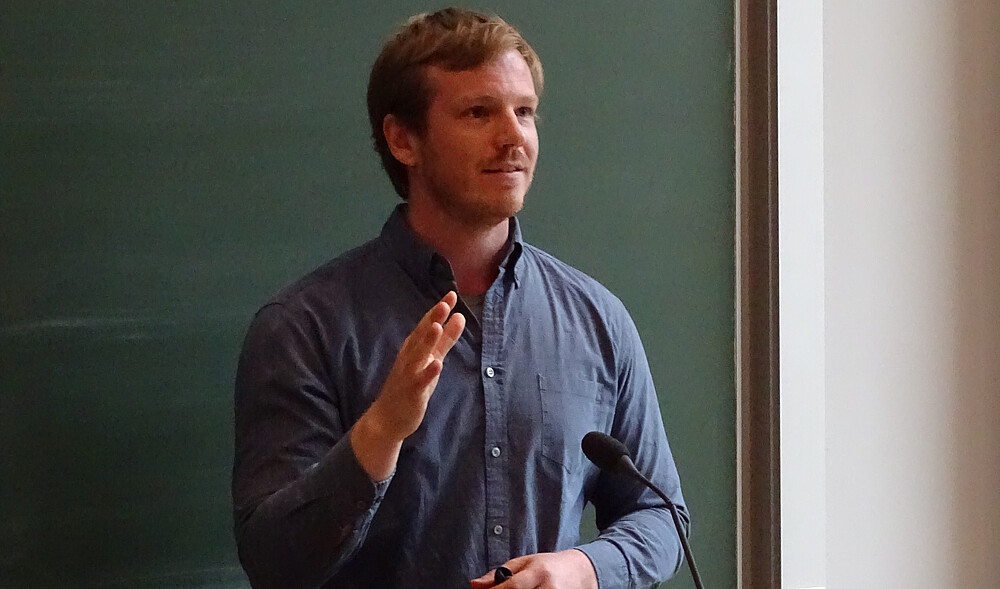Dipl.- Paed. Jan Steffens:
"Intersubjectivity, border and alterity. Social relations in interaction with culture and society"
On April 5, 2018, around 65 interested people attended the second lecture of the lecture series on the topic of "The East-Central European region: Old and new border (crossings)" in the lecture hall at the Görlitz site. The speaker was Jan Steffens, Diplom-Pädagoge from the Faculty of Education at Dresden University of Technology.
While in the first lecture (March 22, 2018) "Grenzland- Brückenland. Borders in the History of Silesia and Upper Lusatia" - held by the director of the Silesian Museum Dr. Markus Bauer - focused on a historical view of borders in geographical and cultural terms, Mr. Steffens devoted himself to a pedagogical and cultural-social-theoretical approach to the topic.
Mr. Steffens introduced the lecture with a video from Amnesty International Poland from 2016, which showed an experiment in which strangers from different cultures looked directly into each other's eyes for four minutes. The speaker picked up on the intimacy evident in the video and referred to "borders as a 'space of encounter'". In the following, Mr. Steffens often referred to findings by Lev Vygotsky and Wolfgang Jantzen, for example, which support this idea. Thus, in this lecture, "border wasnot seenas a line, but as a space of transition and interaction". According to this, people need contact with other people in order to be able to develop further in cultural and social connection. After all, an individual's personality is created at such a border and in exchange with it.
As a next step, Mr. Steffens transferred this content to cultural spaces. Cultural spaces are characterized by shared experiences and stories in the interpersonal sphere, for example through language. Accordingly, interaction takes place at the border between two cultural systems. Consequently, a society emerges at those boundaries between people and crosses cultural systems in the process. At the same time, meanings are institutionalized, for example, terms are adopted in order to reduce complexity. Ultimately, ideologies, world views or entire social orders are formed, which influence individuals in their thoughts and actions. If these processes are no longer questioned, power relations emerge, Mr. Steffens concluded.
In the context of the emergence of geographical or political borders, which in Mr. Steffens' view are always the product of social processes, the audience was able to draw connections to Dr. Bauer's previous lecture.
Mr. Steffens' final topic was hierarchical borders. Here he returned to the topic of power relations. Social classifications that can form during interactions in boundary spaces are institutionalized and over time are seen as 'normal' and natural. In this context, empathy is overridden and social exclusion occurs. Consequently, Mr Steffens called for rehumanization and proposed solutions.
In the discussion that followed, which lasted around twenty minutes, the main focus was on finding new ways to change hierarchical power relations. Mr. Steffens suggested that the moments of resonance between individuals needed to be strengthened or expanded. How exactly this should work in practice needs to be discussed and researched more. It was clear from the questions that many listeners were very interested in the topic and were able to take away new approaches.
In the next lecture on April 19, 2018, interested parties can expect a reading by the speaker Hynek Böhm from the Technical University of Liberec on the topic of "On Border Construction and Social-Geographical Aprroaches". After the historical and cultural-social-theoretical views on the topic of borders that have already been presented, it remains to be seen which view will be commented on in the upcoming lecture, and this is precisely what makes this lecture series so varied.
Text: Petra Eichler, student in the Social Work degree program
Photos: Cornelia Müller
Contact:
Cornelia Müller
Employee in the Master's degree program "Management of social change"
Tel.: 03581/374-4274
Office: Haus GI (Blue Box), Zi. 1.09

